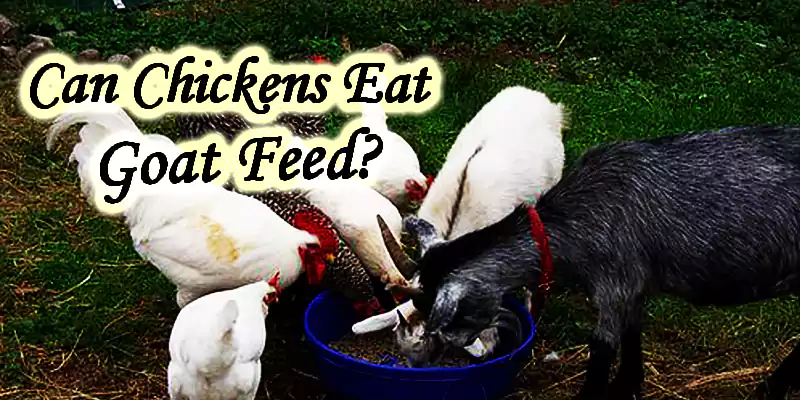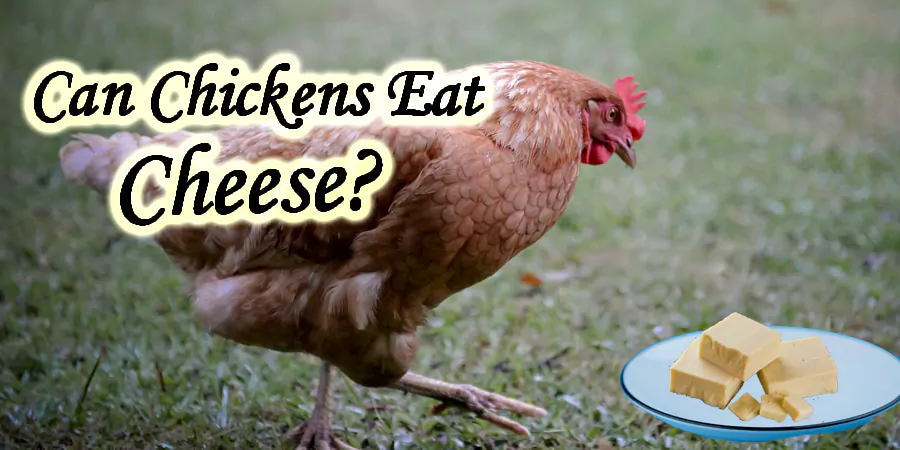Can Chickens Eat Goat Feed? Uncover the Hidden Dangers!
Published: 20 Oct 2024
You are not the only poultry keeper who is curious about: can chickens eat goat feed? Cross-species feeding is discussed in every meeting of chicken enthusiasts. They want to understand their nutritional requirements. They are worried about the potential risks of any feed for the flock. Offering a well-balanced diet is the prime motive of every flock owner.

Can Chickens Eat Goat Feed? Let’s Explore the Truth
Serving goat feed to your flock is not as simple as you might be thinking. Both the species have different nutritional requirements. So, we have to draw a comparison between the nutritional value of their feed.
Is it Safe for Chickens to Eat Goat Feed?
It depends. It is not an ideal diet for chicken growth. It is not a favorable choice for egg-laying hens. Foraging birds can safely munch sparingly. Excessive and frequent serving of goat feed is harmful to backyard friends. It will lead to nutritional imbalance. So, prioritize the nutrient-rich and safe feed for your flock.
Comparison of goat feed vs. chicken feed
| Goat Feed |
|---|
|
| Chickens Feed |
|---|
|
Differences in Dietary Requirements between Chickens and Goats:
Protein Needs:
- Chickens require 16% to 20% of protein content.
- Goats require 15% to 20% of protein content.
Fiber Content:
- Chickens require 4% to 5% of fiber content.
- Goats require 15% to 20% of fiber content.
Energy Sources:
- Chickens require grains like corn and wheat.
- Goats require more complex carbohydrates.
Calcium Requirements:
- Chickens require 3.5-4% calcium in their total diet.
- Goats require lower calcium depending on growth or lactation stages.
Vitamins:
- Chickens need vitamins A, D3, and E for better egg production.
- Goats require vitamins A, D3, and E.
Mineral Needs:
- Chickens need minerals. Phosphorus and salt are crucial for healthy growth.
- Goats also need minerals, such as higher levels of copper and selenium.
Feeding Frequency:
- Chickens need complete feed 1-2 times daily.
- Goats also need multiple small meals daily.
Can Baby Chickens Eat Goat Feed?
No, baby chickens should not eat goat feed. Chicks with their delicate digestive system cannot tolerate the high fiber diet. Additionally, chicks require food with a specific nutritional profile for their growth and safety. Goat feed has high fiber and proteins, which can have negative impacts on baby their health. So, we suggest all chicken owners offer a formulated starter diet to chicks for the first three months.
Does Goat Feed Help Chickens Lay Eggs?
No, goat feed is made to improve lactation, not egg production. Although it contains some healthy nutrients like proteins, calcium and vitamins, it is still not recommended for egg-laying hens. To improve egg quality and egg production, you should prefer a nutrient-rich diet for hens. So, go for something more suitable in this scenario.
How to Serve Goat Feed to Your Chickens?
There are some cautions to serve goat feed to the flock. You must carefully follow these steps for backyard animals’ safe and healthy growth. Here are some cautions:
- Inspect Ingredients: You should be vigilant to identify if there are any sorts of additives or medications added to goat feed. These are harmful.
- Introduce in small amounts: You should minimize the frequency and volume for the safety of your flock. Limit it to under 5% of the total diet.
- Observe Response: You should analyze the reaction from your flock. You should identify the negative signs and symptoms and consult a professional veterinarian.
- Access to fresh water: While serving it to your flock, ensure the availability of clean and fresh water to prevent dehydration and digestion issues.
- Appropriate feeding interval: Frequent feeding of goat feed will increase the chances of nutritional imbalance. So, serve weekly or after ten days.
- Never compromise on routine diet: We have suggested it as their secondary diet. So, always maintain the quantity of their nutritious routine diet.
- Consult with a veterinarian: Deciding after careful analysis of the local conditions is mandatory. So, always consult with your nearby veterinarian first.
Can You Feed Goat Feed to Chickens Everyday?
No, you can’t offer goat feed daily to the backyard flock. We have clarified that it is not recommended as the primary source of nutrition. It can only be served occasionally in limited volume. Excessive use of goat feed is harmful to the growth of chicks. So, daily intake of any feed with high fiber content will negatively impact their health and development.
Benefits of Goat Feed for Chickens
Chickens like to have new food in their treat. Goat feed will be a healthy source of nutrients. Here are some common advantages:
|
Potential Risks of Feeding Goat Feed to Chickens
Goat feed has nutritional benefits but carries some risks and hazards for the flock. These hazards must be understood and adjusted accordingly. Here are some risks:
|
Signs of Goat Feed Allergy in Chickens
Now, if your flock has signs of allergies after eating excessive amounts of goat feed. It is crucial to take remedial action in the initial stage. For that, you should be familiar with typical signs of allergies in chickens. Here are some signs:
- Diarrhea, bloating, and droppings are the result of digestive distress.
- Birds with allergies will show their lack of interest in routine diet.
- The flock will show a lethargic response and no physical activity.
- Loss of feathers and increased molting are also a sign of allergy.
- Skin rashes, irritation, and redness are seen in allergic birds.
- The affected flock will show signs of difficulty breathing or coughing.
- Allergic reactions will reduce the egg production in hens.
- There will be unusual vocals that will show discomfort.
What Type of Goat Feed Can Chickens Eat?
Goat feed has many varieties and dimensions. All of them are not recommended for backyard flock. Here, we review some famous types:
Can Chickens Eat Goat Pallets?
No, Goat pallets are not recommended for the flock. We have concluded that chicks require a well-balanced diet for healthy growth. So, we have to offer them a nutrient-rich diet. It don’t serve the due nutrition. It can lead to nutritional deficiency. So, we advise you to choose an alternate diet.
Can Chickens Eat Goat Hay?
Yes, chickens can have Goat hay in limited quantity. The hay offers dietary fiber. It will engage them in foraging behavior, which reduces stress. We have understood the nutritional profile of timothy hay, which can be served to foraging birds. We have recommended it as a small portion of the routine diet of hens.
Can Chickens Eat Goat Treat?
Yes, chickens can have some goat treats. It must be incorporated in small amounts to prevent nutritional deficiency. It is advised to check the ingredients of such treats before serving them to your flock. Always prioritize the nutrient-rich diet for their well-being.
Can Chickens Eat Medicated Goat Feed?
No, chickens should not have medicated goat feed. The medicated feed is tailor-made for goats and is harmful to the flock. It has some drugs or chemicals that can adversely affect their health. So, avoid using medicated feed for your backyard birds.
Goat Feed Alternatives for Chickens
If you are not satisfied with the benefits of goat feed and looking for some alternatives, then consider these options:
- Layer Pallets: Layer pallets are made explicitly for egg-laying hens. These pallets contain a balance of nutrients like calcium, proteins and vitamins.
- Crumbles: Crumbles are very much identical to pallets but in smaller sizes. They offer better nutritional value and are easier to digest than goat feed.
- Whole grains: Grains are good for diversifying their diet with high nutritional benefits. Oats, wheat, and corn are energy boosters for chickens.
- Fruits: Fruits are good with their sweet flavor and crunchy texture. Figs, eggplant, apples, bananas, and acorns benefit their health.
- Vegetables: We have always preferred natural and nutrient-rich foods as their occasional diet. Celery, turnips, and zucchini are healthy foods.
- Alfalfa Hay: If you select goat feed for proteins and fiber, then alfalfa hay is a better choice. It provides loads of proteins and fiber content with digestive support.
- Kitchen Scraps: Kitchen scraps can be incorporated sparingly into their diet. We do not favor onions, garlic, and avocado.
Conclusion:
Yes, goat feed can appeal to chickens, but some concerns exist. We advise you to serve it occasionally with proper preparation. Moderation is our prime focus when dealing with goat feed for our flock. Excessive intake of goat feed will lead to disastrous outcomes. It can cause nutritional deficiency, digestive issues, and behavioral problems. So, we suggest you serve a well-balanced diet to your flock. Some alternatives to goat feed are fruits, vegetables, alfalfa hay, crumbles, and grains.

- Be Respectful
- Stay Relevant
- Stay Positive
- True Feedback
- Encourage Discussion
- Avoid Spamming
- No Fake News
- Don't Copy-Paste
- No Personal Attacks

- Be Respectful
- Stay Relevant
- Stay Positive
- True Feedback
- Encourage Discussion
- Avoid Spamming
- No Fake News
- Don't Copy-Paste
- No Personal Attacks


